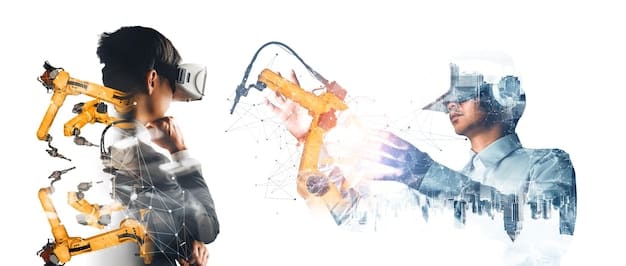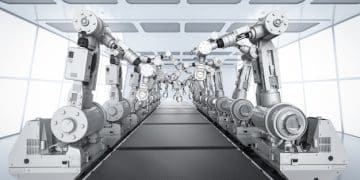AI and the US job market: Will AI create more jobs or take them?

The future of work in the US is being reshaped by AI, raising questions about whether it will lead to more job creation or displacement.
The rise of artificial intelligence is sparking both excitement and anxiety about its impact on employment. Will the future of work in the US: will AI create more jobs than it displaces? Let’s analyze this.
AI’s impact on the job market
Artificial intelligence is transforming industries across the board. Its impact is felt in sectors from manufacturing to healthcare to finance. This technological revolution raises a critical question: how will AI shape the job market in the United States?
Automation and job displacement
One of the primary concerns is automation. AI-powered systems can perform tasks more efficiently. This is especially true in routine and repetitive roles. This leads to fears of widespread job displacement.
AI algorithms can analyze vast amounts of data, leading to more informed decision-making. This could reduce the need for human analysts in certain roles. As AI technology matures, more complex tasks will be automated, which will affect a wider range of professions.

- Automation can lead to increased efficiency and productivity.
- Job losses and displacement are potential risks of automation.
- Workers may need to acquire new skills to adapt to the changing job market.
While some jobs will be eliminated, AI will also create new opportunities. New roles will emerge in AI development, maintenance, and implementation. These positions will require specialized skills and training. As AI becomes more integrated into various sectors, the demand for AI specialists will continue to grow.
New job creation due to AI
While job displacement is a concern, AI also promises to foster job creation. The development, implementation, and maintenance of AI systems create new roles. It demands specialized skills and expertise. This new demand could potentially offset the number of jobs lost to automation.
The rise of AI-related industries
AI is fueling the growth of new industries and sectors. Companies specializing in AI technology are expanding and hiring skilled professionals. This includes data scientists, machine learning engineers, and AI consultants. These roles did not exist a decade ago, showing how AI is opening up new avenues for employment.
The AI market is expected to grow exponentially. This will drive the demand for AI-related jobs. Startups and established companies are investing heavily in AI. This will spur further job creation and economic growth. Governments and educational institutions are also recognizing the need to support AI development. This creates even more opportunity for new generations.
- AI is creating new industries and job roles.
- The AI market is growing rapidly, driving demand for AI professionals.
- Investment in AI development is spurring economic growth and job creation.

The potential for job creation is not limited to the tech sector. AI has the potential to transform various industries. This creates a need for professionals who can integrate AI solutions into existing businesses. This could include AI trainers, AI product managers, and AI-enhanced customer service representatives. This shows how AI can lead to a broader range of opportunities across diverse fields.
Upskilling and reskilling initiatives
To successfully adapt to the changing job market, upskilling and reskilling initiatives are crucial. Workers need to acquire the skills for working alongside AI systems. This will enable them to remain valuable and competitive. Educational institutions, companies, and governments need to collaborate to provide training and resources for these efforts.
Online platforms offer a wide range of courses. They make it easier for workers to learn new skills and enhance their knowledge. These courses cover topics such as AI fundamentals, data analysis, machine learning, and human-computer interaction. By taking advantage of these educational resources, workers can improve their adaptability and career prospects.
Government and employer support
Governments can play a vital role in supporting upskilling and reskilling initiatives. They can provide funding for training programs, offer tax incentives to companies that invest in employee development, and create partnerships between educational institutions and industries. These efforts can ensure that workers have access to the resources they need to stay ahead of the curve.
Employers should also prioritize employee training and development. They can offer internal training programs, provide tuition reimbursement for external courses, and encourage employees to participate in workshops and conferences. By investing in their workforce, companies can ensure they have the skills they need to leverage AI technologies effectively.
- Upskilling and reskilling are crucial for adapting to the changing job market.
- Online platforms offer a wide range of courses and educational resources.
- Governments and employers can support upskilling initiatives through funding and training programs.
Upskilling and reskilling are not just about acquiring new technical skills. They also involve developing soft skills such as critical thinking, problem-solving, creativity, and communication. These skills are essential for working collaboratively with AI systems and adapting to rapidly changing work environments. The ability to think critically and solve complex problems will be increasingly valuable in the age of AI.
The evolving nature of work
The integration of AI into the workplace is changing the nature of work itself. Instead of replacing human workers entirely, AI often augments their capabilities, allowing them to focus on more strategic and creative tasks. This collaboration between humans and AI can lead to increased efficiency, innovation, and job satisfaction.
Human-AI collaboration
AI can automate routine and repetitive tasks, freeing up human workers to focus on more complex and rewarding activities. For example, in customer service, AI-powered chatbots can handle basic inquiries, allowing human agents to focus on resolving more challenging and sensitive issues. This division of labor can improve both the customer experience and employee morale.
AI can also provide workers with insights and recommendations to help them make better decisions. Data analysis tools can identify trends and patterns that humans might miss, enabling workers to make more informed choices and optimize their performance. This can lead to increased productivity and better outcomes in a wide range of fields.
- AI augments human capabilities, allowing workers to focus on more strategic tasks.
- Human-AI collaboration can lead to increased efficiency and innovation.
- AI provides workers with insights and recommendations to improve decision-making.
Successful integration of AI into the workplace requires careful planning and implementation. Companies should focus on identifying tasks that can be automated or augmented by AI, and then provide their employees with the necessary training and support to work effectively alongside AI systems. This involves not only technical training but also developing new workflows and processes that leverage the strengths of both humans and AI.
The role of government and policy
Governments play a critical role in shaping the future of work in the age of AI. Policies can promote responsible AI development, support upskilling and reskilling initiatives, that ensure that the benefits of AI are shared broadly. These policies can help to mitigate the negative impacts of automation and create a more equitable and sustainable job market.
Investing in education and training
Governments should invest in education and training programs. These help workers acquire the skills they need to thrive in the changing job market. This includes funding for STEM education, vocational training, and apprenticeships. It is relevant to the skills that become increasingly important in the age of AI. These investments can ensure that workers have access to the resources they need to stay competitive.
Governments can also provide incentives for companies to invest in employee training. Tax credits, grants, and other forms of support can encourage employers to offer internal training programs and provide tuition reimbursement for external courses. By partnering with businesses, governments can ensure that training programs are aligned with the needs of the industry and prepare workers for the jobs of the future.
- Governments play a critical role in shaping the future of work with AI.
- Investing in education and training is essential for preparing workers for the jobs of the future.
- Policies can support responsible AI development and ensure that the benefits of AI are shared broadly.
In addition to education and training, governments can also implement policies to support workers who are displaced by automation. This may include unemployment benefits, job placement services, and programs to help workers transition to new careers. By providing a safety net for displaced workers, governments can help to ease the social and economic disruptions caused by technology.
Addressing ethical and societal concerns
As AI becomes more integrated into the workplace, it is essential to address ethical and social concerns. This includes issues. It includes issues such as bias in AI algorithms, data privacy, and job quality. Proactive measures should be taken to mitigate these risks and ensure that AI is used in a fair and responsible manner.
Ensuring fairness and transparency
AI algorithms can perpetuate and amplify existing biases if they are trained on biased data. It is essential to ensure that AI systems are free from bias. This involves careful data collection and analysis, as well as ongoing monitoring to detect and correct any biases that may emerge. Transparency in AI decision-making is also important. Workers can understand how they come to their conclusions and can hold them accountable.
As workers create more data, this becomes more of a privacy risk. Employees should be informed about how their data is being used and have the right to access, correct, and delete their data. Companies should also implement security measures to protect employee data from unauthorized access or misuse.
- Addressing ethical and societal concerns is essential for responsible AI implementation.
- Ensuring fairness and transparency in AI algorithms is crucial to prevent bias.
- Protecting worker data privacy is a key ethical consideration.
In addition to addressing bias and privacy, it is also important to ensure that AI does not lead to a decline in job quality. Companies should take steps to ensure that AI does not lead to excessive workloads, reduced autonomy, or a loss of job satisfaction. This may involve redesigning jobs to leverage the strengths of both humans and AI or providing workers with opportunities for training and advancement.
| Key Point | Brief Description |
|---|---|
| 🤖 Automation & Job Displacement | AI automates tasks, potentially displacing workers from routine roles. |
| 💼 New Job Creation | AI creates new jobs in AI development, maintenance, and related fields. |
| 📚 Upskilling & Reskilling | Workers must acquire new skills to work alongside AI systems effectively. |
| 🛡️ Ethical Considerations | Bias in algorithms and data privacy require careful attention. |
Frequently Asked Questions
▼
While AI will automate certain tasks, it will also create new ones. The net effect on job numbers is still debated, but many expect a shift in required skills rather than mass unemployment.
▼
Technical abilities like data analysis and AI programming are valuable, but so are soft skills such as communication, critical thinking, and creativity. These are harder for AI to replicate.
▼
Upskilling is crucial. Take online courses, attend workshops, and stay informed about AI trends in your industry. Focus on developing skills that complement AI’s capabilities.
▼
The government can invest in education and training programs, as well as provide a safety net for displaced workers through unemployment benefits and job placement services.
▼
Yes, bias in AI algorithms and data privacy are significant concerns. It’s important to ensure AI systems are fair, transparent, and do not perpetuate discrimination in hiring or promotions.
Conclusion
The impact of AI on the future of work in the US is complex and multifaceted. While concerns about job displacement are valid, AI also presents opportunities for job creation, increased productivity, and economic growth. By focusing on upskilling and reskilling initiatives, addressing ethical concerns, and implementing supportive government policies, the US can navigate this technological transformation successfully and ensure that the benefits of AI are shared broadly.





